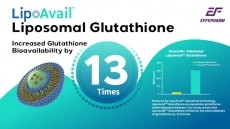Compound Sol. doles out Chinese CoQ10
distribution of Chinese-sourced CoQ10 - potentially further
relieving tight supply of while generating more competition between
Chinese and Japanese sources.
The California-based ingredients supplier will represent the Chinese company Hangzhou Zhongmeihuadong Pharmaceutical (HZH) in the distribution of potent antioxidant coenzyme CoQ10 across North America and Europe.
The gap between demand and supply of CoQ10, which had reached a critical point, is narrowing as new sources such as this enter the market - giving major manufacturers more competition.
CoQ10 has been studied for its role in cognitive health and heart health. It plays a vital role in the production of chemical energy in mitochondria - the cell's 'power plants' - by participating in the production of adenosince triphosphate (ATP), the body's co-called 'energy currency'.
HZH supplies fermentation-produced CoQ10 and, according to Compound Solutions, its plant recently passed a US Food and Drug Administration inspection for a pharmaceutical product. HZH has a $45m joint venture with pharmaceutical giant Merck.
The five-year agreement will allow Compound Solutions a virtually unlimited supply of CoQ10 at as little as one month's notice, manager of business development and operations Matthew Titlow told NutraIngredients-USA.com.
"We will no longer buy CoQ10 from any other sources and HZH will not sell through any other distributor in North America or Europe," said Titlow of the deal.
"This brings a critical ingredient to a much wider audience," said Titlow, who opinions the shift towards Chinese sourcing of the antioxidant to be popularization of what was once a more pricey ingredient.
Historically four Japanese players, including Kaneka, have dominated the CoQ10 market with the capacity to supply multi-ton quantities of the ingredient. Three produce CoQ10 through a fermentation process and one through organic synthesis.
However, in 2002, there was a considerable drop in quantities available for export from the country following an ease of regulations that caused the ingredient to be used in more locally sold products. This export shortage coincided with a scientific study presenting strong evidence CoQ10 could slow the progression of the neurodegenerative disease Parkinson's.
As consumers clamored for supplements containing the antioxidant, formulators sought to meet this demand.
Last year supply was reported to be so tight that the on-the-spot price of CoQ10 was said to have reached between US$4000 and $5000 per kg.
By the beginning of May this year the on-the-spot price was said to have dropped to around $1500 per kilo - a significant come-down as the major manufacturers increased capacity to meet demand.
Kaneka, for example, has expanded production from 150 metric tons to 180 metric tons and is constructing a plant in Pasadena, Texas with an initial annual capacity of 100 metric tons to cater to US demand.
With other new players such as HZH entering into the North American and European market, the price of CoQ10 is likely to drop further.
Other Asian entrants to the North American CoQ10 market include Taiwanese company PharmEssentia, which has spent the last two years perfecting its own organic synthesis production process.
Compound Solutions CEO Barry Titlow is chairman of the AOAC International CoQ10 Standards Committee, funded by the National Institutes of Health. The purpose of the committee is to develop and validate a global testing standard for CoQ10.











